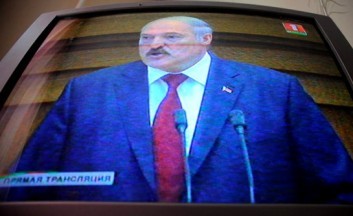Alexander Lukashenko delivered State of the Nation Address to the Belarusian people and the National Assembly.
 The situation has not changed
The situation has not changed

On 8 May Alexander Lukashenko delivered his annual address at the National Assembly.
There was an intrigue over the address as it had been unexpectedly postponed. In such a situation, the most unpredictable sensations could have been expected. However, Lukashenko’s performance did not bring anything sensational. On the contrary, it was one of the least colourless and seemingly meaningless annual addresses ever. The lack of clear vision (namely, in terms of geopolitical choice) could be regarded as a key message of Alexander Lukashenko. By doing so, he makes it clear to the outside world, and to Europe in particular, that he is ready to begin a dialogue with the West “from scratch”. The President declared his willingness to resume the dialogue with the European Union, which is viewed as an important partner and political vector. At the same time, he attempted to avoid using his traditional offensive clichés to the West.
He once again outlined the list of issues which he is ready to discuss and make concessions on, such as the possible amnesty of the political prisoners on the Independence Day, a moratorium on the death penalty, the preparation and holding of the election campaign, the security of the western border.It should be pointed out that Alexander Lukashenko behaves very cautiously while touching upon these issues. He did not make any special commitments or obligations, he just outlined the range of issues and made it clear that there might be a significant progress in dealing with them. This was most obvious when he spoke the moratorium on capital punishment. On the one hand, he defended this practice, but on the other hand, he ended his statement with the words: “Maybe our society is ready to introduce a moratorium or ban capital punishment. Then we will make the decision together”.
While speaking about Russia, he avoided any evaluation, although the context of his address demonstrated that the Eastern vector and Eastern integration are not top priorities for Belarus.
He stressed out a deep interest in cooperation with China and the developing countries.
In terms of internal policy, Lukashenko made it clear that there would be no radical reform of the current social model. Welfare state is a fundamental value for him. However, he admitted that the existing model had outlived itself and needed transformation. He spoke a lot about modernization (“A new age needs a new economy”). However, he did not offer a clear vision of the modernization. The President restricted his speech to stating general principles, such as innovation, investment, etc.
Lukashenko also very carefully touched upon the issue of privatisation. In general, he did not object to privatisation, although he brought about too many “buts”. It is evident that he personally does not have a clear outlook on this issue. The most worrying statement was his promise to increase average salaries to $500 by the year-end. According to the experts, such a decision may trigger new crisis phenomena in the Belarusian economy.
On the eve of his address to the parliament, Alexander Lukashenko issued Decree № 6 “On the stimulation of entrepreneurial activities in the medium and small towns and rural areas” which was positively estimated even by the opposition-minded experts. This decree shows that the President is willing to make steps to liberalize the economy.
Subscribe to our newsletter




Situation in Belarus
Constitutional referendum: main consequences


 Video
Video
How to count the political prisoners: are the new criteria needed?


 Video
Video
Paternalism In Decline, Belarusian Euroscepticism, And The Influence Of Russia


 Video
Video












